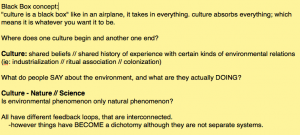The ideas of Culture and Nature are often put in direct opposition to each other, but in reality, this distinction is so much less rigid, and so much more multi-faceted.

Interwove Culture & Nature Taken From: https://iseethics.files.wordpress.com/2014/05/nature-culture1.jpg
Within Western perception, nature has become increasingly thought of as a “place without humans”, yet separating the natural from humans is incredibly dangerous. How do we then consider anthropogenic sources of environmental damage?
Is it better to think of Culture/Nature as recursive? We share the world around us, but we rely on nature and are a part of it….so is culture part of nature or nature a part of culture? Culture defines nature, but culture also exists within nature.
When we think about culture/nature as a fluid concept, versus as a binary, we open up space to accept different methods of environmental management, and allow for these methods to coexist. Embracing the ambiguity of culture/nature versus looking at it through a rigid lens gives us opportunities for greater understanding about human/environment relations.
Conflating Culture/Nature with Different Identities
The culture/nature divide becomes even more interesting when you look at it in conflation with different identities. Are different identities such as gender inherently in conflict with environmentalism? For example, when you mix gender considerations into the culture/nature binary, it mirrors how a binary is an ineffective and incomplete way of examining relationships. Despite this, does the idea of “gendered ways of knowing” push gender into a binary, or does it display a reality of overlapping identities?
I think a crucial element to understanding this is thinking of gender, and many other identities as a performative aspect. If different identities have an aspect of performance, that explains the crucial connection between humans and their environment because we interact with our environment through our actions and inactions. We perform identities and we resultantly perform actions. These things are incredibly interconnected, and not in opposition.
Takeaway
The most important point within the culture/nature discourse is that environmental frameworks should allow for dynamism and fluidity, while encompassing concepts of educational status, monetary status, gender, race and other categorizing elements. Intersectional analyses of these things are necessary to contextualize knowledge within a society.

